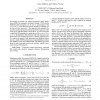Free Online Productivity Tools
i2Speak
i2Symbol
i2OCR
iTex2Img
iWeb2Print
iWeb2Shot
i2Type
iPdf2Split
iPdf2Merge
i2Bopomofo
i2Arabic
i2Style
i2Image
i2PDF
iLatex2Rtf
Sci2ools
121
click to vote
ICASSP
2011
IEEE
2011
IEEE
Maximum marginal likelihood estimation for nonnegative dictionary learning
We describe an alternative to standard nonnegative matrix factorisation (NMF) for nonnegative dictionary learning. NMF with the Kullback-Leibler divergence can be seen as maximisation of the joint likelihood of the dictionary and the expansion coefficients under Poisson observation noise. This approach lacks optimality because the number of parameters (which include the expansion coefficients) grows with the number of observations. As such, we describe a variational EM algorithm for optimisation of the marginal likelihood, i.e., the likelihood of the dictionary where the expansion coefficients have been integrated out (given a Gamma conjugate prior). We compare the output of both maximum joint likelihood estimation (i.e., standard NMF) and maximum marginal likelihood estimation (MMLE) on real and synthetical data. The MMLE approach is shown to embed automatic model order selection, similar to automatic relevance determination.
Related Content
| Added | 21 Aug 2011 |
| Updated | 21 Aug 2011 |
| Type | Journal |
| Year | 2011 |
| Where | ICASSP |
| Authors | Onur Dikmen, Cédric Févotte |
Comments (0)

